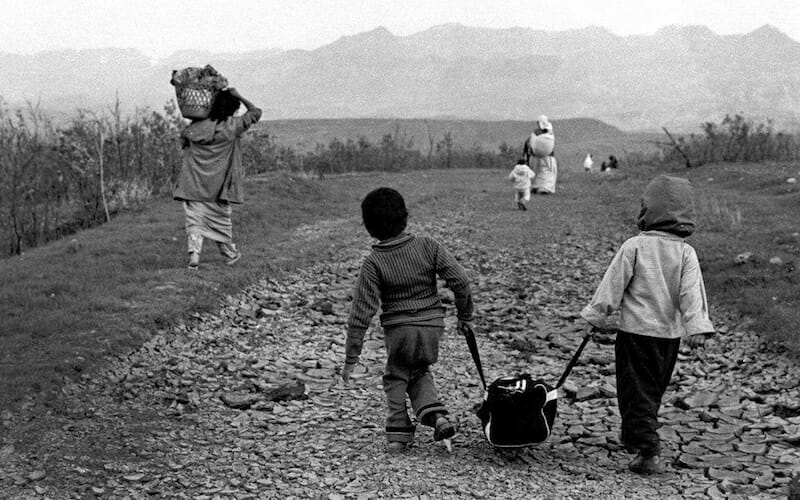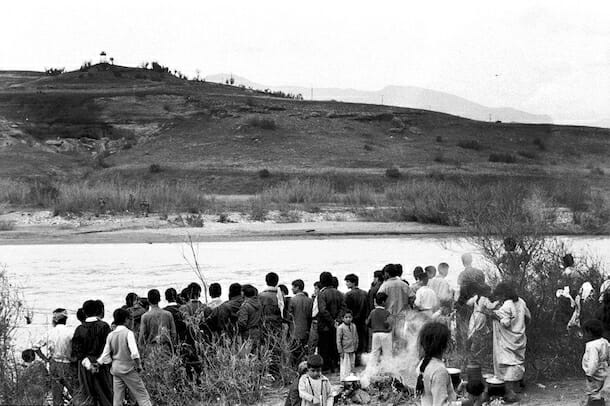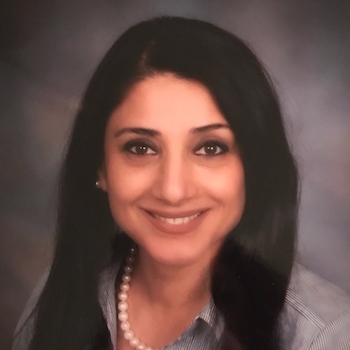
The Agonizing Chapter of the Iraqi Kurds
The Kurds in northern Iraq celebrated their liberation from the dictatorship for a mere 24 days. On April 1, 1991, approximately three million men, women, and children began migrating from the Kurdistan of Iraq to the borders of Turkey and Iran. BBC News described this migration as the mass exodus of Kurdish refugees that occurred after the failed revolution of the Kurds against the Ba’ath’s regime. At that time, I was 19 years old living at home with my parents, four sisters, and one brother. We suspected that anything could happen to Kurdistan or its people in the hands on Saddam Hussein’s regime, but one day we found ourselves fleeing our home with the unknown ahead of us.
My father was a brilliant genius who was very well respected in the community. He was interested in political debates and he gently deliberated with people who had different dogmatic views, while he was never affiliated to any political party. He never disrespected different opinions; he thought he could always learn from the perspectives of others. My father always thought politics were messy and that if you are involved, you have to wear different hats based on the situation. He thought that politics had ample amounts of gray area that make the world a complicated, controversial, and challenging place. Nevertheless, he was able to predict, interpret, and very vividly analyze the local and the international governments’ political activities and strategies.
Some of the Iraqi Arbs in the south and the Kurds in the north, believed that after eight years of the Iran-Iraq war and the failure of the gulf war (the invasion of Kuwait), Saddam’s regime had weakened and that it was no longer a challenge for the people to rebel and rise up in order to take the regime down. While most of us knew little about Iraqi republican guards and how barbaric and ruthless they could be, we later learned that they were the toughest, the most trained, and top well-paid Iraqi military force.
The argument between my mother and father started when my father said, “I predict agony and that we all have to evacuate our homes soon.” He stated, according to the news that Saddam may direct his republican guards to regain the Kurdish cities. “I do not want those bastards to torture my family and rape my daughters.” My mother was very bothered by the remarks my father shared with us and she encouraged us not to listen to him. She cleaned the house, baked dozens of breads, and was looking forward to get some rest after dinner. However, my mother would not indulge in the rest she deserved; instead, she helped the family to pack for an unwanted journey that we knew close to nothing about.
What should we pack? Where are we going? How could we all fit in one small sedan? How long will we be away from home? We did not know answers to these questions, but we knew that as the evening was approaching, leaving home was becoming more of a challenge and the level of panic within all of us was rising.
The first thing my father grabbed was his radio. The rest of us grabbed all the food we could carry, along with clothing, blankets, umbrellas, matches, flashlights, and batteries. We thought, “Now what? Where are we heading with all this trivial stuff we just collected?” The entire neighborhood was outside and everyone was loudly talking over one another. People were angry, sad, and they cried from the fear of what was to come. Like my family, most people in the city had skipped dinner that night and were unknowingly preparing for the largest Kurdish migration in history.
My father rushed us, but he remained focused and in control of the situation. After he communicated with his young cousin, Omar (who owned an 18 wheeler), he told us all to go and sit in the truck until Omar was ready to leave. At this point, we still did not know where we were going. We took our father’s orders and one by one climbed up into the truck. All of us got in the truck, except my brother who decided to stay behind. My mother was heartbroken, as she always favorited her sons over her daughters. My brother reassured her and told her that he would get into his car and follow in our direction if it got worse.

Omar’s truck quickly filled. It could not hold any one else and some of our neighbors had to be left behind. While I did not know some of the people who lived on the other side of our neighborhood, most of the people on the truck were our good neighbors and some of them were even our first and second cousins.
Very late in the evening, the entire city seemed to be on the road walking or driving into the unknown. Many walked and many drove for hours without end. Some ran out of gas and diesel, leaving their cars and trucks behind to begin walking with the poor people who did not own cars. The people who were walking has been doing so for a while, dealing with the brutal cold weather and in the hopes of reaching the border soon.
The Turkish government announced that they would permit roughly 20,000 Kurds to enter Turkey and to stay in a transit camp. Despite the relief effort from the neighboring countries, nearly 400,000 Kurds were living under very poor condition. Hundreds were dying everyday due to cold weather and hunger, and many developed dangerous diseases because of the unsanitary living environments. With the help from the Turkish soldiers, only the sickest of people were transported to the villages for treatment. While some people fled to the mosques nearby for shelter, others entered these sacred spaces with their dead family members and loved ones to later bury.
To prevent starvation, very small food rations were dropped down by parachutes once or twice a day. People were killed fighting over the food. Some people were crushed by the boxes that were being dropped. Some of the boxes of rations even landed in minefields, where people rushed to grab their fair share, but were killed by the mine explosions.
Medical assistance was scarce. There were enough staff and supplies to only help a few thousand people. Nothing was done to rescue the dying people. Pregnant women were dying during childbirth because of the lack of professional midwives, nurses, and medical assistance. Most of the newly born babies were dying a few hours after labor due to improper care or lack of baby supplies. Many young children were losing their battle with pneumonia in filthy tents that were used as a temporary hospital rooms. People who escaped from dying in the hands of Saddam’s regime, died in the mountains and on the borders of other countries.
Updates on the status of the fleeing Kurds at the Turkish border were reported by BBC News. We heard these broadcasts through the small radio my father brought with him and from my brother, who fled to meet us not long after our departure. My brother had told us that he ran out of gas and with no alternative, continued on the foot until he arrived to the Iran border, where he eventually found us.
What I witnessed with my family on the Iran border was not much different from what was happening at the Turkish border. Due to the high number of refugees, the United Nations arrived in the western Iranian border and built six camps to house thousands of Kurds needing shelter. Some vehicles that had remaining fuel or obtained fuel from the border, were still on the move. Some people were still walking, not knowing when to stop or turn around or how many more miles and days they would have to travel.
Obtaining food and blankets was a total nightmare. BBC announced that the Iranian air force began their relief efforts through the use of helicopters, but unfortunately, due to the bad weather, the relief missions were cut by half. The Iranian air force began distributing 30 tons of rice and bread among the refugees at the Iran border. While 30 tons seems like a large amount, it barely scratched the surface for those in need.
The Kurds had entered Iran and some of them were filling the roads, while others were denied entry. The rest of us had to stay on the border and sleep in Omar’s truck. Survival mode had become challenging for everyone. Everyone who was displaced, suffered mental, emotional, and physical damage that created a major disconnect with humanity. Some people were beaten and humiliated by the armed guards at both borders, while others were driven by their hunger, the unbearable cold, their anger and frustration to fight over food, clothing, blankets and shelter. Some of the refugees even stole from one another with the hopes of seeing another day.
Countless people were separated from their loved ones and some were lost and not found until weeks or months after they returned home. My mother was separated from us as when she went down a hill to a natural spring, in the attempt to wash up for evening prayer. We did not realize that she was missing until hours later, when we all returned back to the truck. Once we returned, my father realized that the love of his life and the mother of his nine children was missing, he grabbed his coat, an umbrella, and a flashlight to go and look for her with Omar, who insisted on going with him. That night, it rained cats and dogs and the hail was the size of golf balls.
My father and Omar started their search a little after 11pm. Those of us left in the truck began crying and blaming each other for not going with my mother to the spring. However, the very next day around 5am, our mother appeared in the dark. With her wet clothes, a croaky voice, and huffy mood, she climbed up in the truck with assistance from our father and Omar. We all screamed of joy and the fact that she was still alive! Thirteen days later, after we all were out of food, clean clothes, and other supplies, my father said, “I think it is now safe to return home.”
In 1991, many Kurds had trusted and placed their hope in the United States of America and the George H.W. Bush’s strategies and administration. They thought because the Kurds were allies of the Americans, President Bush would protect their human rights and would not abandon them in their time tragedy and need. Unfortunately, most Kurds soon began to see the true colors of the Bush administration and held the U.S. government responsible for their mass migration to the unknown. President Bush was involved in the Gulf War and fought alongside European countries to save the lives of only one million Kuwaiti people, but he did not care about the lives or the rights of three million migrated Kurds. While all of this unfolded, my idol, Madonna, the American singer and entertainer I watched on American television networks, was asking the Americans for compassion and contributions for Kurdish relief through the Red Cross!

